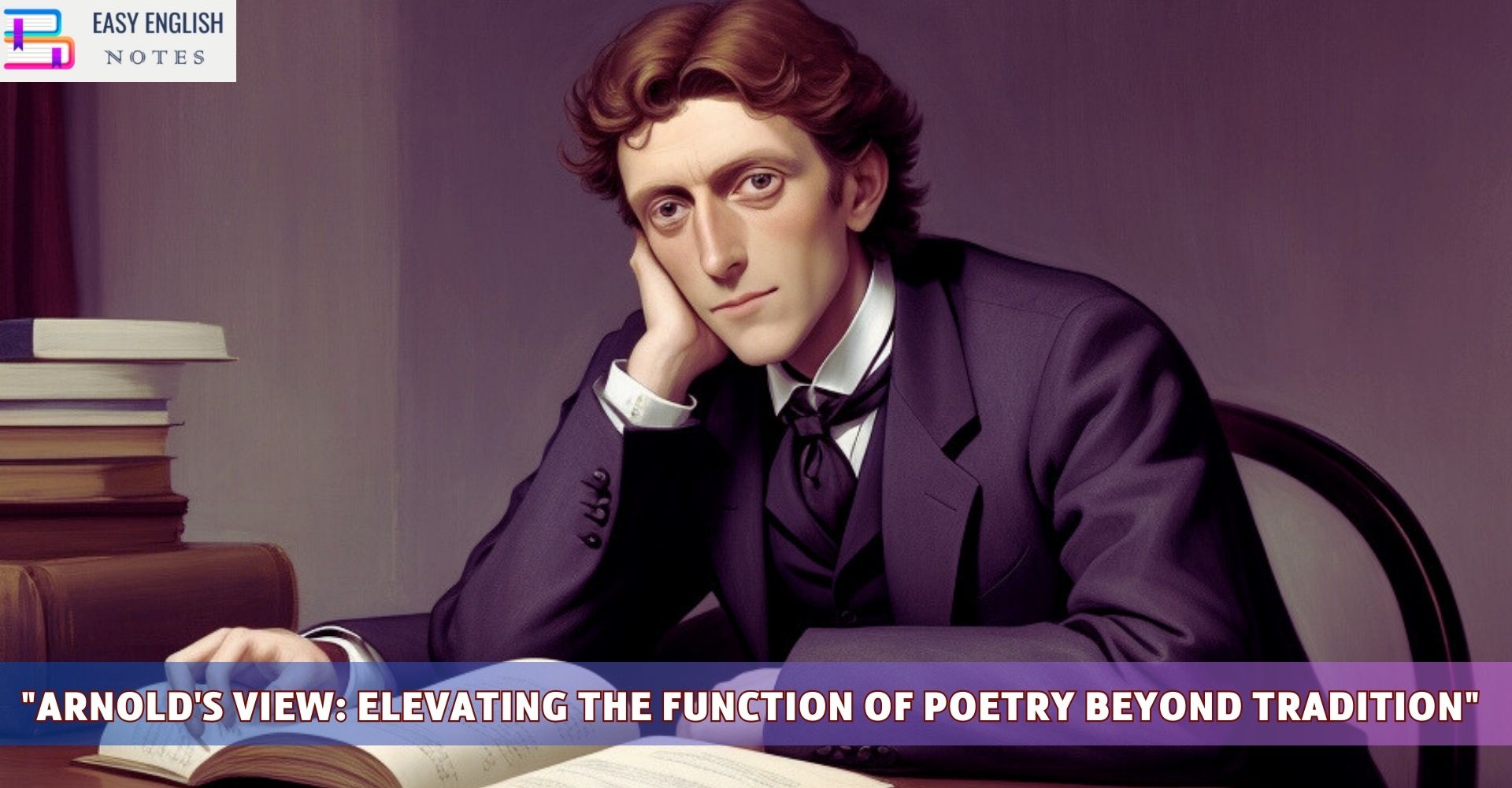Poetry has great future. Mankind will find more and more sustenance in poetry. The idea is all that matters in poetry, and the idea has a life eternal. The fact is unstable. For instance, the fact-the crucifixion of Christ-upon which Christianity is based, is now failing it, being challenged by the critical spirit of the age.
We should think of poetry as having a higher use than occasional diversion. Its function is to interpret life for us. Science is incomplete without poetry. Wordsworth rightly calls poetry “the impassioned expression which is in the countenance of all science-the breath and finer spirit of all knowledge.” Science is a matter of the intellect, and therefore, appeals to the limited man. Poetry is a matter of emotions and imaginations, and therefore, it appease to the whole man.
Arnold thinks very highly of the future of poetry. Mankind will turn more and more to poetry, for religious drama and long continued traditions are being challenged day by day and cannot be expected to yield any more sustenance to the human spirit. For poetry the idea is everything and the idea generates emotions. It is necessary that our attitude to poetry should change, if it were to serve its real purpose. We do not take poetry as seriously as we should. Many think of poetry as diversion for the moment. It is poetry that interprets life for us. Wordsworth calls poetry the breath and finer spirit of knowledge. And that is the right approach to poetry. Arnold believes that poetry will one day replace what now passes with us for religion. Science too will appear to be incomplete without poetry. Poetry will humanize science, religion and philosophy, such as they are. noted for a concentration of thought and expression-packing of sense. profound, passionate, soul stirring, into a minimum of words.
Arnold, however, finds the note of high seriousness in these lines:
Had we never loved sae kindly.
Had we never loved sae blindly
Never met, or never parted.
We had never been.
But it is not continuous or sustained. On the whole Burns has the truth of matter and the truth of manner, but not the accent of the master. He has an ironical sense of life and things, often crossed and lightened by Tenderest pathos often approaching Virgil’s Lacrymae Rerum (sense of tears in things mortal).
Arnold compares Burns with Chaucer. Like Chaucer’s his view is large, free, shrewd, benign-truly poetic, but Chaucer’s freedom is replaced by a fiery energy in burns, and Chaucer’s benign grace, by a deep sense of pathos, and Chaucer’s fluent melody, by more impassioned rhythm and quicker movement. Chaucer portrays a fairer and more gracious world, but Burns can but seldom escape from the world of Scotch drink, Scotch religion and Scotch manner though as Arnold confesses, he can reveal truth and beauty in such a world. But the comparison seems to be rather unfair for Chaucer is pre-eminently a narrative poet, and Burns, pre- eminently a lyric poet.
Also Read :
- Compare Hamlet with Macbeth, Othello and other Tragedies
- “The Pardoner’s Tale” is the finest tale of Chaucer
- Prologue to Canterbury Tales – (Short Ques & Ans)
- Confessional Poetry – Definition & meaning
- Line By Line Explanation Of The Poem The Eve of St. Agnes
Matthew Arnold, in his critical writings, held a profoundly elevated view of the function of poetry, distinct from many of his contemporaries. For Arnold, poetry was much more than a mere artistic or aesthetic pursuit; it was a vital cultural and moral force. He saw poetry as a means to both understand and improve the human condition.
- Moral and Ethical Function: Arnold believed that poetry plays a significant role in the moral and ethical development of individuals and society. He saw it as a source of wisdom and insight, a medium through which profound truths about life, human nature, and the human condition could be explored and imparted. Poetry, in Arnold’s view, had the power to uplift, educate, and morally enlighten both the individual and society.
- Aesthetic and Emotional Function: Besides its moral utility, Arnold also recognized the aesthetic value of poetry. He believed that poetry should provide pleasure, not just through its beauty of form and language but also through the elevation and enhancement of the reader’s emotional and intellectual faculties. For Arnold, the best poetry was a harmonious blend of thought and feeling.
- Criticism of Life: One of Arnold’s most famous ideas is that poetry is a “criticism of life.” By this, he meant that poetry should not just mirror the superficial aspects of life but should critically examine and represent the deeper realities of the human experience. Poetry, according to Arnold, should delve into the complexities and contradictions of life, providing not just a reflection but a thoughtful, discerning critique.
- Consolation and Escape: In an age characterized by rapid industrialization and social change, Arnold also saw poetry as a source of solace and escape. He believed it could provide a respite from the harsh realities of the modern world, offering a space for reflection, contemplation, and emotional relief.
In summary, Matthew Arnold conceived poetry as a powerful and multifaceted tool that serves not only aesthetic and emotional purposes but also plays a crucial role in the moral and intellectual development of individuals and society. His conception elevates poetry to a status of high importance, seeing it as integral to the cultivation of a well-rounded, thoughtful, and ethically grounded society.
PLEASE HELP ME TO REACH 1000 SUBSCRIBER ON MY COOKING YT CHANNEL (CLICK HERE)











